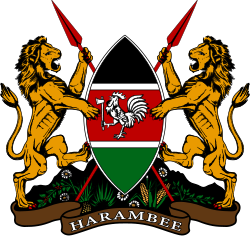| Attorney General of Kenya | |
|---|---|
since 20 August 2024 | |
| Style | The Honourable |
| Type | Judiciary of Kenya |
| Residence | Nairobi, Kenya |
| Nominator | President of Kenya |
| Appointer | The president |
| Term length | No fixed term |
| Formation | March 1, 1906 |
| First holder | Alfred Kerney Young |
| Deputy | Solicitor General of Kenya |
| Website | www |
 |
|---|
The Attorney General of Kenya is the head of the Kenyan State Law Office, the principal legal adviser to the government of Kenya, and a member of the Cabinet. Dorcas Agik Oduor is the current and first woman Attorney-General of Kenya. [1]